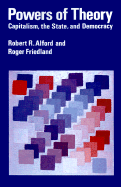Book contents
- Frontmatter
- Contents
- Preface
- Acknowledgments
- Introduction: State and society in theoretical perspective
- 1 Theoretical perspectives as modes of inquiry
- PART I THE PLURALIST PERSPECTIVE
- PART II THE MANAGERIAL PERSPECTIVE
- PART III THE CLASS PERSPECTIVE
- 12 State and society in class perspective
- 13 The capitalist state and accumulation
- 14 The capitalist state and class struggle
- 15 The class perspective on the democratic state
- 16 The class perspective on the bureaucratic state
- PART IV THEORY, POLITICS, AND CONTRADICTIONS IN THE STATE
- Glossary
- Bibliography
- Name index
- Subject index
13 - The capitalist state and accumulation
Published online by Cambridge University Press: 01 June 2011
- Frontmatter
- Contents
- Preface
- Acknowledgments
- Introduction: State and society in theoretical perspective
- 1 Theoretical perspectives as modes of inquiry
- PART I THE PLURALIST PERSPECTIVE
- PART II THE MANAGERIAL PERSPECTIVE
- PART III THE CLASS PERSPECTIVE
- 12 State and society in class perspective
- 13 The capitalist state and accumulation
- 14 The capitalist state and class struggle
- 15 The class perspective on the democratic state
- 16 The class perspective on the bureaucratic state
- PART IV THEORY, POLITICS, AND CONTRADICTIONS IN THE STATE
- Glossary
- Bibliography
- Name index
- Subject index
Summary
In the functional class perspective, a state emerges with a form dictated by the requirements of capitalism as a unique form of political economy. The state must sustain, on the one hand, capitalist accumulation and, on the other, capitalist class rule. And yet, as we shall see, as an organization the state is hardly theoretically visible at all. In a more political view, because capitalism is a contradictory mode of production, the state must inherently endure crisis and class struggle. In this chapter, we shall present class analyses of the state as it developed historically to facilitate capital accumulation. In the following chapter, the state's relation to class struggle and crisis will be the focus of our attention.
Class and state formation: the societal level
The class perspective sees the origins of the capitalist aspect of the state in the political and economic requirements of capitalist accumulation. There can be no theory of the state abstracted from a particular mode of production. Class theorists agree that the capitalist mode of production, for the first time in world history, made the economy an institutional sphere autonomous from any other institution (for example, the family, the state, law, religion).
- Type
- Chapter
- Information
- Powers of TheoryCapitalism, the State, and Democracy, pp. 288 - 307Publisher: Cambridge University PressPrint publication year: 1985

